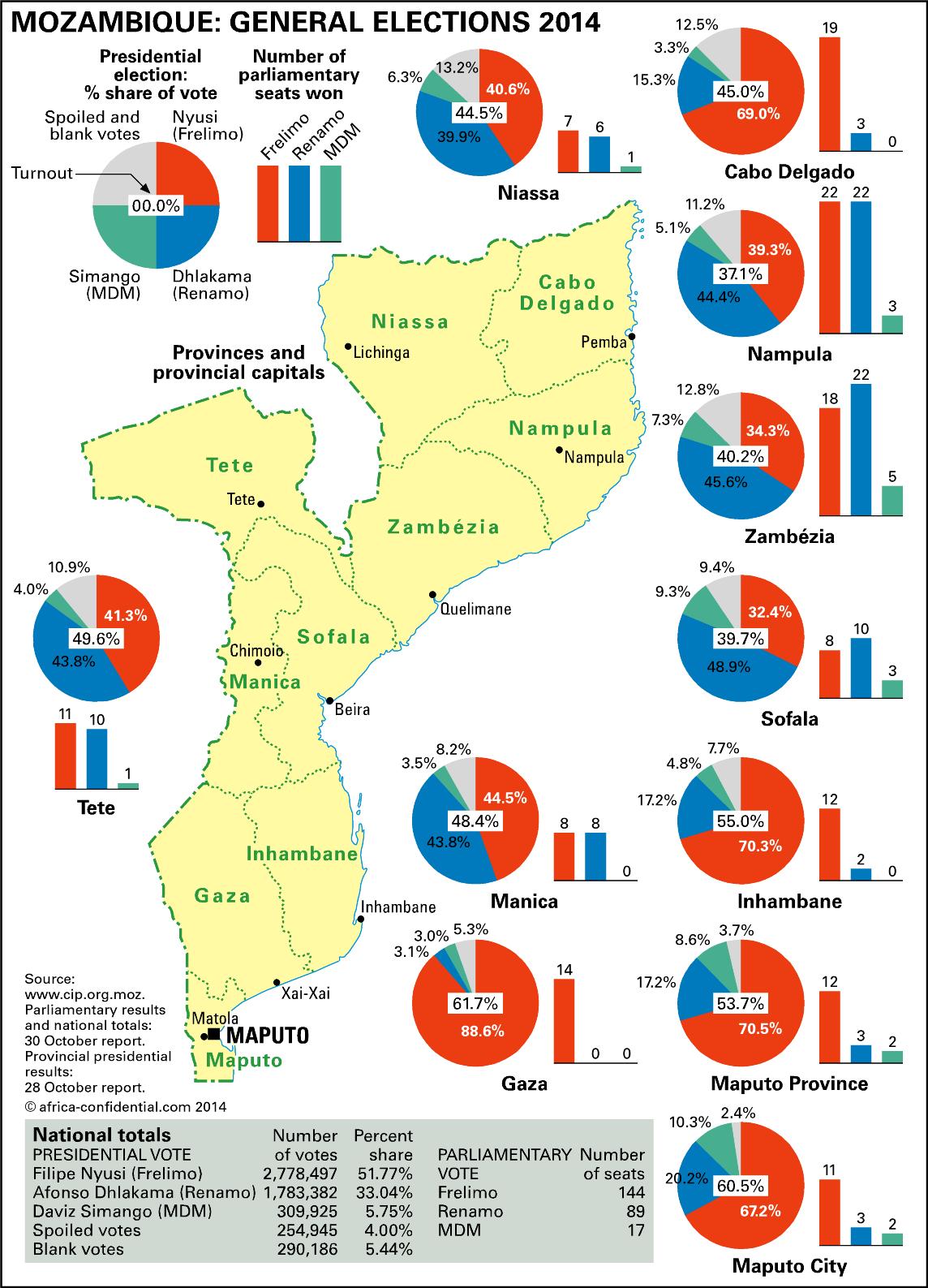Clean break
Nyusi's
accession to power and Guebuza's resignation as Frelimo Chairman mark the most
abrupt break in continuity at the top since Independence in 1975 (AC Vol 56 No
7, A farewell to Armando). Until the resignation, there were fears that his
barely concealed fight with his successor as state President could derail the
country's development plans. His way clear and his battle won, Nyusi must now
make good on his promises of change, Maputo pundits say. Since his inauguration
as national President in January, his predecessor had tried to interfere with
his orders to ministers and to prevent him from negotiating personally with the
leader of the Renamo Party (Resistência Nacional Moçambicana), Afonso Dhlakama.
Nyusi's serenity in the face of this onslaught won him respect. During
Frelimo's three-day Central Committee meeting which opened on 26 March, Guebuza
dug his own political grave as he alienated former allies so thoroughly that
they turned on him on the final day. He fell on his sword the following morning,
Sunday 29 March, and Nyusi was then voted in as the new Party President. He lost
only three votes – one blank and two spoiled – which we hear were those of
Guebuza, his wife Maria da Luz Dai Guebuza and their businesswoman daughter,
Valentina da Luz Guebuza. Word about the meeting has recently emerged. Although
Guebuza's friends warned him that he needed to preserve his dignity – and in
all probability his business interests – by surrendering
gracefully,
he was apparently blind to the danger he was in. As a result, the backlash
deeply shocked him as former loyalists such as a former Foreign and later Environment
Minister, Alcinda Abreu, angrily backed earlier accusations that Guebuza
controlled the party through intimidation. In the end, it was his hubris that
weakened his judgment and left him isolated. The independent newspaper Savana
summed it up in a front-page headline: 'Abandonado'. The accompanying
photograph showed a crestfallen ex-President. The long view sees Guebuza's
downfall as a sad end for a leader who brought in improvements in infrastructure,
greater foreign investment and increased professionalism amongst state
officials. However, this gave way to increased insecurity and violence as weak
and corrupt institutions undermined business and failed to spread the benefits
of economic development to the population. Guebuza surrounded himself with
people widely seen as mediocre sycophants, such Edson Macuácua and party
Spokesperson Damião José (AC Vol 55 No 22, Nyusi's rocky road). José has been
sacked and there is talk in the party of replacing staff on the Secretariat.
Rescuing
the state finances will be one of Nyusi's greatest challenges, along with the
seeminglyimpossible
task of achieving lasting peace with Renamo. Buoyed by the internal conflict in
Frelimo,Dhlakama seems resolved to escalate his demands. Nyusi is inclined to
negotiate but there will be a limit to what he can give. Frelimo's fraud during
the last elections was extremely widespread, most now agree, but Dhlakama's
claims of outright victory remain implausible (AC Vol 55 No 21, Frelimo wins,
Renamo revives). It is unlikely Renamo would be allowed to rule in all the
provinces that voted its way and Frelimo members are not the only ones who see
dangers in regional autonomy. Importantly, however, Nyusi does not have the
visceral intolerance of Renamo and Dhlakama that Guebuza displayed. He could be
a more reasonable and skillful negotiator. Without the intransigence born of a
fear of losing face, the two sides may make better progress. The pressure on
Nyusi to deliver is now great. As Guebuza found out, the disappointment of your
friends can be more dangerous than the wrath of your enemies. Nyusi faces the
future with immense popular good will but vast expectations, too.
Copyright
© Africa Confidential 2015
http://www.africa-confidential.com

22 comentários:
Bursa
Kırşehir
Muş
Mersin
Çanakkale
C36
sakarya
yalova
elazığ
van
kilis
DLJ
van
düzce
mardin
elazığ
sakarya
LGOY81
görüntülü.show
whatsapp ücretli show
J8Y0
Malatya Lojistik
Antep Lojistik
Urfa Lojistik
Sivas Lojistik
Erzurum Lojistik
QMBHUS
İstanbul Lojistik
Zonguldak Lojistik
Konya Lojistik
Ağrı Lojistik
Ordu Lojistik
5MQS
33BD0
Antep Lojistik
Adıyaman Parça Eşya Taşıma
Bayburt Evden Eve Nakliyat
Çorlu Lojistik
Siirt Lojistik
AE5D2
Tunceli Evden Eve Nakliyat
Ordu Evden Eve Nakliyat
Antalya Lojistik
Malatya Lojistik
Kütahya Evden Eve Nakliyat
C9092
Kırıkkale Evden Eve Nakliyat
Kırşehir Evden Eve Nakliyat
Osmaniye Parça Eşya Taşıma
Uşak Evden Eve Nakliyat
Aksaray Evden Eve Nakliyat
EE74F
defilama
shiba
bitbox
arculus
zkswap
trezor suite
raydium
avax
arbitrum
fhbgfhbnfgjhnghmgj
صيانة افران مكة
gdfhgbfghfgjjk
صيانة افران مكة
شركة تنظيف خزانات بخميس مشيط rF8nFHEoRv
شركة تسليك مجاري بالاحساء phVsO3Zs2h
شركة تنظيف خزانات بابها 68j1WkvArf
شركة تسليك مجاري بالاحساء fFJCBqjuI7
شركة تنظيف سجاد بابها dREFpOw1fC
شركة عزل اسطح بالقطيف AyTDLAZ8kc
1250C095AA
türk takipçi satın al
FA3F7D1D51
mobil ödeme takipçi
gerçek takipçi
çekilişle takipçi satın al
TL Trafik Cezası Nedir
Yunanca Sayılar
Şinasi Hangi Romanın Kahramanı
Ahmet Cemil Hangi Romanın Kahramanı
TL Trafik Cezası Nedir
Geçici kimlik Belgesi ile e-Devlet şifresi alınır mı
BADF916C33
Telegram Güvenilir Madencilik Botları
En İyi Telegram Oyun Botları
Telegram Para Kazandıran Botlar
Telegram Para Kazanma
Binance Hesap Acma
C2FB5E5974
instagram garantili takipçi al
instagram beğeni satın al
fake takipçi
twitter takipçi
bayan takipçi
Post a Comment